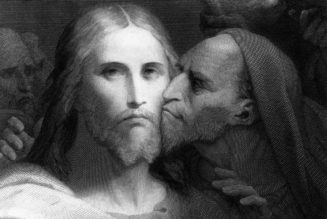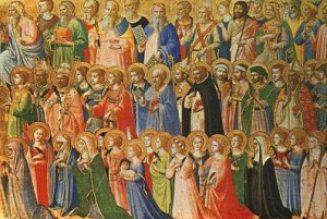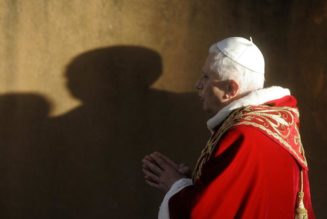 In today’s Gospel, we see Jesus commanding the wind and sea during a storm. He rebukes the wind and tells the sea, “Quiet! Be still!” and a great calm settles. His disciples in the boat, in awe at what they’ve witnessed, say to one another, “Who then is this whom even wind and sea obey?” It’s a stunning moment for them, but there’s another striking detail contained in this Gospel – a detail which Jesus’ disciples found completely unremarkable before the storm: Jesus was resting in the boat, he was asleep on a cushion in the stern. Christ wielding divine power is an important sign, but the fact that Jesus took naps also contains lessons for us that I’ll discuss a bit later.
In today’s Gospel, we see Jesus commanding the wind and sea during a storm. He rebukes the wind and tells the sea, “Quiet! Be still!” and a great calm settles. His disciples in the boat, in awe at what they’ve witnessed, say to one another, “Who then is this whom even wind and sea obey?” It’s a stunning moment for them, but there’s another striking detail contained in this Gospel – a detail which Jesus’ disciples found completely unremarkable before the storm: Jesus was resting in the boat, he was asleep on a cushion in the stern. Christ wielding divine power is an important sign, but the fact that Jesus took naps also contains lessons for us that I’ll discuss a bit later.
The Book of Exodus records how the Lord had previously commanded winds and waters to save his people when he parted the Red Sea: “The Lord drove back the sea with a strong east wind all night long and turned the sea into dry ground. The waters were split, so that the Israelites entered into the midst of the sea on dry land.” God commanded the waters as with his words from the Book of Job: “Thus far shall you come but no farther, and here shall your proud waves be stilled!” Even though God brought the Hebrews safely through the Red Sea to Mount Sinai, delivering them from their Egyptian slavemasters, they were not yet free. God had gotten his people out of Egypt, but he needed to get Egypt out of his people.
Habits and attitudes from their years of bondage had to be unlearned. To do this, God’s Mosaic covenant commanded them, for example, to sacrifice animals which the Egyptians associated with their pagan deities, such as bulls and rams. To slay and offer up these creatures to the Lord undermined the cults of the false gods. Likewise, when you desire to turn away from old sinful habits, absolutely pray for God’s help and go to Confession, but also after that do more than just passively hoping that things will change. Take positive steps in the right direction. Make an act of your will to renounce your sins. Literally say: “I renounce the sin of (such-and-so).” and then actively avoid the patterns which you know lead you into sin. Like those bulls and rams sacrificed on God’s altar, kill and burn your idols.
Another way in which the Lord sought to train the Hebrews out of the old mindset and routines of their prior slavery was through giving them a weekly vacation day. God commanded his people:
“Remember to keep holy the sabbath day.
Six days you may labor and do all your work, but the seventh day is the sabbath of the Lord, your God.
No work may be done then either by you, or your son or daughter, or your male or female servant, or your beast, or by the alien who lives with you.”
As slaves in Egypt, the Hebrews worked long days for long stretches of days. It was grueling labor, fueled by fear of painful consequences. But the Lord did not wish for them to carry with them this slave mentality toward work. So he gave them a special day, every week, for worship, rest, and joy. God desires the Lord’s Day, Sunday, to be such a day for us.
When I was an undergrad at college, my studies were my daily grind. I looked forward to my college breaks, but those could be weeks or months away, and were always on the other side of due dates and exams. Although I faithfully attended Mass I had never observed Sunday as a special day of rest. The Catechism of the Catholic Church teaches:
“On Sundays and other holy days of obligation, the faithful are to refrain from engaging in work or activities that hinder the worship owed to God, (that hinder) the joy proper to the Lord’s Day, (that hinder) the performance of the works of mercy, (or that hinder) the appropriate relaxation of mind and body.” Then it notes, “Family needs or important social service can legitimately excuse from the obligation of Sunday rest. (However,) the faithful should see to it that legitimate excuses do not lead to habits prejudicial to religion, family life, and health.”
So I resolved in those days of college to abstain from doing homework or studying on Sundays. I had some very late Saturday nights, but I held faithfully to this rule. And over time, I noticed two surprising things. First, my Sunday resting never burned me academically. I can’t recall ever bombing a test, failing to meet a deadline, or doing worse on my assignments because I didn’t work on Sunday. My second great surprise was that I began looking forward to every Sunday as a one-day vacation. In addition to going to Mass, Sunday was a day for me to take a nap, see a movie, play a game, hang out with friends, or do anything delightful. I sacrificed a gift of myself to the Lord and he gave me an even greater gift in return. So I urge you to be courageous and intentional about keeping and celebrating the Lord’s day of rest yourself.
Let’s return to Jesus sleeping in the boat. What lessons does this teach us? First, the fact that he sleeps means he is a real human being who can personally relate to our own lived experience. Jesus knows firsthand what it’s like to be one of us, and he compassionately understands us.
Second, his sleep shows us that human fatigue is not a sin. Sometimes in confession I hear older people accuse themselves of laziness because they aren’t as productive as they were when they were decades younger. I encourage these persons to be easier on themselves. The Stations of the Cross recount Christ falling down three times. Jesus’ holy, loving spirit was willing, but his flesh was weakened, and none of his physical limitations, missteps, or stumbles were sins. Our own bodily limitations are not sins either.
A third lesson from Jesus napping is that caring for your body is an ordinary part of doing God’s will. While taking his nap, Christ isn’t preaching to the crowds, healing the sick, or performing mighty miracles, but he is exactly doing his Father’s will. And this rest prepares Jesus to do the Father’s works after. When I hear a parent in confession say they blew up unusually at their children, lost their temper and yelled at their kids, I ask that person whether they’re tired. Their answer is almost always yes. That’s not surprising, since everything is harder when you’re tired. Rather than disregarding your body, realize that sleeping well, eating right, and trying to be physically active can be important in enabling you to do God’s will.
St. John writes in his 1st New Testament epistle: “This is how you can recognize the Spirit of God: Every spirit that acknowledges that Jesus Christ has come in the flesh is from God.” Jesus Christ, God’s divine Son, took rest and enjoyed rest as a human being like us. Let us learn from his holy example.
Join Our Telegram Group : Salvation & Prosperity


![‘Chasing Ice’ captures largest glacier calving ever filmed [language warning]…](https://salvationprosperity.net/wp-content/uploads/2020/06/chasing-ice-captures-largest-glacier-calving-ever-filmed-language-warning-327x219.jpg)






